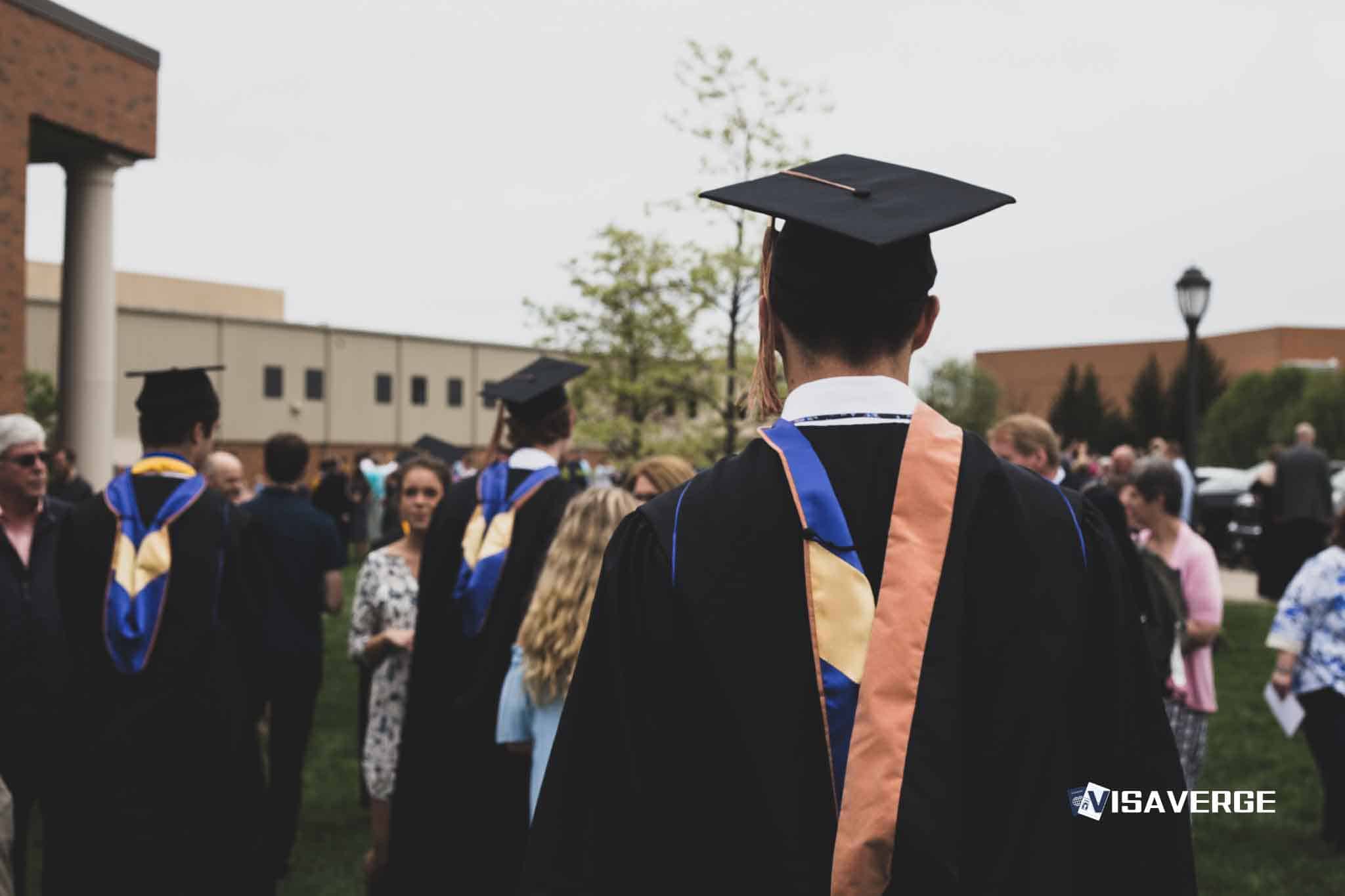Key Takeaways
• From May 2, 2025, Denmark restricts student visas and removes work permit access for non-approved programs.
• Work visa applicants must meet new salary thresholds from January 1, 2025, or be denied entry.
• Starting Q4 2026, ETIAS pre-authorization is mandatory for travelers from over 60 visa-exempt countries.
Denmark has long been known for its high quality of life, strong education system, and openness to international talent. But recent changes have signaled a clear shift. Starting in 2025, Denmark is tightening its visa and travel requirements, affecting students, workers, and the millions of people who visit the country every year. These updates, in line with what many other countries are now doing, aim to make sure the system works as intended—to allow genuine travel, study, and work, while reducing misuse. If you are thinking about coming to Denmark, whether to learn, work, or visit, there are new details you need to know.
Major Changes to Denmark’s Entry and Visa Rules

Tighter Student Visa Restrictions
One of the biggest updates affects international students. From May 2, 2025, Denmark will enforce stricter student visa restrictions, especially for people from outside the European Union who plan to study at schools not officially approved by the government. This is a major development that targets what officials see as abuse of student permits for reasons other than education.
Under the new policy, several rights and options will be removed for these students:
- No More Limited Work Permits: Until now, many students enrolled in non-approved programs could get a small work permit as part of their student visa. This allowed them to work a set number of hours while studying. Under the new rules, these work permits will no longer be available.
- No Six-Month Post-Graduation Stay: In the past, students graduating from these programs could stay for six months to search for a job in Denmark. That option is now gone, which limits students’ chances to secure work after their studies.
- No Family Reunification for Students: Previously, students could sometimes bring their spouse, partner, or even children with them. This right will be removed for students in non-state-approved programs.
These steps aim to make sure people coming to Denmark as students have a true intention to study, not to use the student route for work or longer stays without a real reason. It’s a change meant to protect the country’s education system and labor market.
It’s important to note that the rules only apply to new applications made on or after May 2, 2025. If someone already holds a student permit, or applied before that day, they will not be affected by the changes—they will keep their current rights. This helps avoid sudden disruption for those who have already made plans based on the existing system.
VisaVerge.com’s investigation reveals that the motivation behind these stricter student visa restrictions is to prevent the misuse of educational routes that were sometimes being used for reasons other than genuine studies. According to officials quoted by multiple sources, this move should help maintain the quality and integrity of Danish education while protecting genuine international students.
Work Visa Updates: New Salary Requirements
Another set of big changes involves work visas. Starting January 1, 2025, the process for hiring foreign workers in Denmark will include new salary requirements. The Danish Agency for International Recruitment and Integration, usually known as SIRI, will begin using updated salary thresholds to decide if the pay being offered matches what is usual in Denmark.
What does this mean for someone hoping to work in Denmark? First, the offered job must pay at least as much as similar jobs in Denmark. This step is meant to prevent low wages and to protect both local and foreign workers. If a company tries to hire someone for less than the typical Danish wage, the application is likely to be denied.
The point is simple: Denmark wants to keep its job market fair. By setting a clear rule for work-based residence permits, the government is trying to avoid situations where employers bring in foreign talent under unfair conditions. At the same time, this move helps local workers by making sure wages in Denmark are not driven down by outside competition.
Another update coming on January 1, 2025 is a revision of application fees for all immigration services, including student and work permits. The new fee schedule will replace the previous system and is set by the government each year. This means that people hoping to come to Denmark should check the latest rates before they apply. For anyone feeling confused about these updates, the official SIRI website provides detailed instructions and explanations for each type of permit and the new fees.
Travel Requirements: ETIAS Authorization Coming Soon
It’s not just students and workers who will see changes. From the fourth quarter of 2026, Denmark will join other countries in the Schengen Area and require ETIAS authorization for many travelers who today do not need a visa. ETIAS stands for European Travel Information and Authorization System—a digital travel permit that is becoming a new part of travel requirements across Europe.
Who will be affected? Anyone from one of the more than 60 countries whose citizens do not need a visa to visit Denmark (or most of Europe) for short trips will soon need to get this authorization before they arrive. This includes people from the United States, Canada, Australia, Japan, South Korea, and many other countries.
The ETIAS system is pretty straightforward: travelers fill out an online form, pay a small fee, and get approval if there are no concerns. Once you have it, the authorization is good for multiple visits over three years, as long as each trip does not go beyond 90 days within any 180-day period.
This new step is being introduced to help bolster security and better track who is entering Europe. While it’s an extra requirement, it’s not expected to be a big barrier to travel. The main thing to remember is that, soon, even people from visa-free countries will have an important new item on their travel checklist for Denmark and other Schengen states. Current details on the ETIAS system can be found through the official Schengen visa information website.
Why Are These Changes Happening?
Denmark’s new rules on student visas, work permits, and travel requirements fit into a bigger global pattern. Since late April and early May 2025, several other major countries—such as Canada 🇨🇦, the United States 🇺🇸, New Zealand 🇳🇿, and Finland 🇫🇮—have announced or rolled out similar updates to their own entry systems. These changes are usually meant to:
- Tighten border security,
- Make immigration systems easier to use and manage,
- Reduce ways for people to take advantage of loopholes,
- Protect wages and job opportunities for local workers,
- Maintain the integrity of education and work-based immigration routes.
The main goal is to strike a balance between welcoming genuine travellers, students, and talent—while making it harder for the system to be used for reasons other than those intended.
According to reports from various immigration news outlets, including statements by Danish officials, the specific focus is on making sure Denmark remains attractive to those who truly wish to study or contribute through work, rather than simply providing a backdoor for people who might leave as soon as they get the chance.
Who Is Affected—and What Should You Do?
If you’re a student thinking about Denmark for higher education, especially at a non-approved school, you need to check very carefully if your plans fit within the new rules. If you apply before May 2, 2025, you’ll fall under the old rules; after that date, the student visa restrictions will apply to your case.
For prospective workers, checking that your job offer meets the new salary standards is more important than ever. Employers should also update their offers and paperwork to meet the new criteria, since failing to do so can mean an immediate denial.
Travelers, even those from visa-exempt countries, will need to become familiar with ETIAS and start the application process before traveling—no exceptions. Planning ahead will be key to avoid disruptions.
Some of the common questions now coming up include:
- Will current students/workers lose any rights? No, as long as your permit was given or your application submitted before the new rules begin.
- Can students still work or stay after graduation? Only if they are enrolled in state-approved programs. For others, those rights are ending.
- How much is the new salary threshold? The government will announce exact amounts before January 2025. Always check SIRI’s official page for the latest.
- Is ETIAS like a visa? No, it’s not a full visa, but a pre-authorization needed before you travel if you’re from a country that doesn’t need a traditional visa.
What’s the Broader Impact of Denmark’s New Rules?
The changes to travel requirements and visa rules in Denmark reflect bigger trends seen worldwide. More countries are moving to stricter systems that require more careful planning from visitors and immigrants. Many are using digital systems and more checks before entry, making border crossings more organized, but sometimes also more complex.
For Denmark, this means:
- Some students who might have come to Denmark may now choose other countries or delay their plans.
- Some employers may need to rethink their hiring or raise wages to bring in foreign talent.
- The country should see fewer cases of people using student or tourist status for reasons other than those allowed.
- Tourists and business travelers will face one more step before arrival, but this is being introduced as a security measure, not as a ban.
These outcomes show how policies meant to protect a system can have wide effects. While the main idea is to ensure fair play and security, there is always the risk that genuine visitors or students may be discouraged by extra paperwork or barriers.
How to Stay Informed and Prepared
The most important thing for anyone affected by these changes is to stay up to date with official information. Entry rules are changing, and forms, fees, or required documents can be updated at any time. Official government sites are the best place to check details before you make plans or travel. For Denmark, this includes the main immigration portal.
Preparing early—whether applying to study, getting a job offer, or planning a trip—will make it easier to adjust to these new travel requirements. Checking your eligibility and the latest instructions can save you time, money, and a lot of stress.
Final Thoughts
Denmark’s recent visa and travel changes bring the country in line with a growing list of nations increasing their entry controls. While these new student visa restrictions, salary requirements, and ETIAS travel rules might seem strict, they are part of a trend meant to keep borders safe and the immigration system fair. If you are looking to visit, study, or work in Denmark, double-check your plans and make sure you understand the new travel requirements. Taking the time to review the latest updates will put you in a better position to succeed—whether your goal is studying at a top university, starting a new job, or simply exploring Denmark’s beautiful cities and countryside.
Learn Today
Student Visa Restrictions
→ Policies limiting international students’ rights to work, stay post-graduation, or bring family, affecting non-approved programs in Denmark.
ETIAS → European Travel Information and Authorization System—mandatory online pre-authorization required for many travelers to Denmark and the Schengen Area.
SIRI → Danish Agency for International Recruitment and Integration, responsible for processing immigration, work, and study permits in Denmark.
Salary Threshold → Minimum salary requirement foreign workers must meet to qualify for a work-based residence permit, updated annually by Danish authorities.
Family Reunification → Immigration process allowing students or workers to bring immediate family members to Denmark under specific circumstances.
This Article in a Nutshell
Denmark is revamping its immigration and travel rules, impacting students, foreign workers, and travelers. New student visa restrictions begin May 2, 2025. Updated salary requirements apply to work visas from January 1, 2025. ETIAS authorization becomes essential for most non-EU travelers in late 2026. Prepare early to avoid disruption.
— By VisaVerge.com
Read more:
• STEM OPT Crisis leaves international students facing visa status loss
• Trump Administration Orders Colleges to Report International Students
• ICE targets Indian students after Columbia University dorm searches
• Indian Student Rajat jailed in Singapore for molesting Singapore Airlines cabin crew
• International PhD Students Warn: Sweden Is a ‘Trap’












